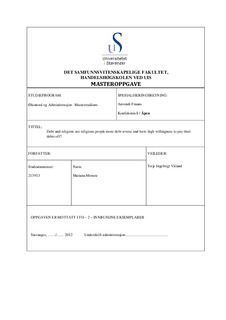| dc.contributor.author | Moraru, Mariana | |
| dc.date.accessioned | 2012-10-31T09:34:24Z | |
| dc.date.available | 2012-10-31T09:34:24Z | |
| dc.date.issued | 2012 | |
| dc.identifier.uri | http://hdl.handle.net/11250/183950 | |
| dc.description | Master's thesis Finance | no_NO |
| dc.description.abstract | Religion has always played an important role in lifestyle of many people. Recently many scholars have started to focus on interconnections between religion and different economic aspects. This thesis is an attempt to define whether religion (through religious beliefs, prayer and other religious behaviors) has an influence on young people’s attitudes toward debts and their willingness to pay off their debts.
It was learned an interesting fact, that religious young people (who feel themselves religious, pray, etc) were more debt-averse and had a higher willingness to pay off their debts in comparison to those, who did not consider themselves as religious people, never prayed etc, or in other words, non-religious people. Moreover, results from the current study shows that Islamic people tend to be more debt averse and more “debt responsible” (have higher willingness to pay debts off) rather than Christians. | no_NO |
| dc.language.iso | eng | no_NO |
| dc.publisher | University of Stavanger, Norway | no_NO |
| dc.relation.ispartofseries | Masteroppgave/UIS-SV-HH/2012; | |
| dc.subject | debt | no_NO |
| dc.subject | religion | no_NO |
| dc.subject | debt | no_NO |
| dc.subject | culture | no_NO |
| dc.subject | økonomi | no_NO |
| dc.subject | administrasjon | no_NO |
| dc.title | Debt and religion: are religious people more debt averse and have high willingness to pay their debts off? | no_NO |
| dc.type | Master thesis | no_NO |
| dc.subject.nsi | VDP::Social science: 200::Economics: 210 | no_NO |
| dc.source.pagenumber | 62 | no_NO |
